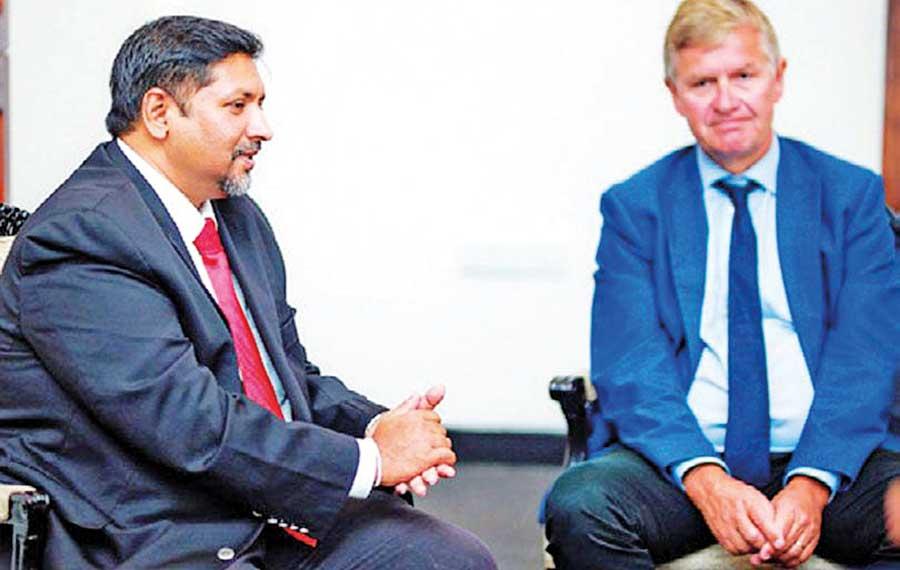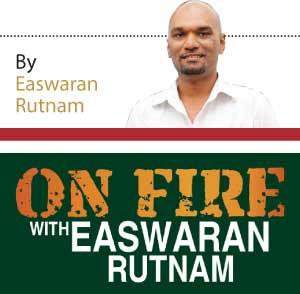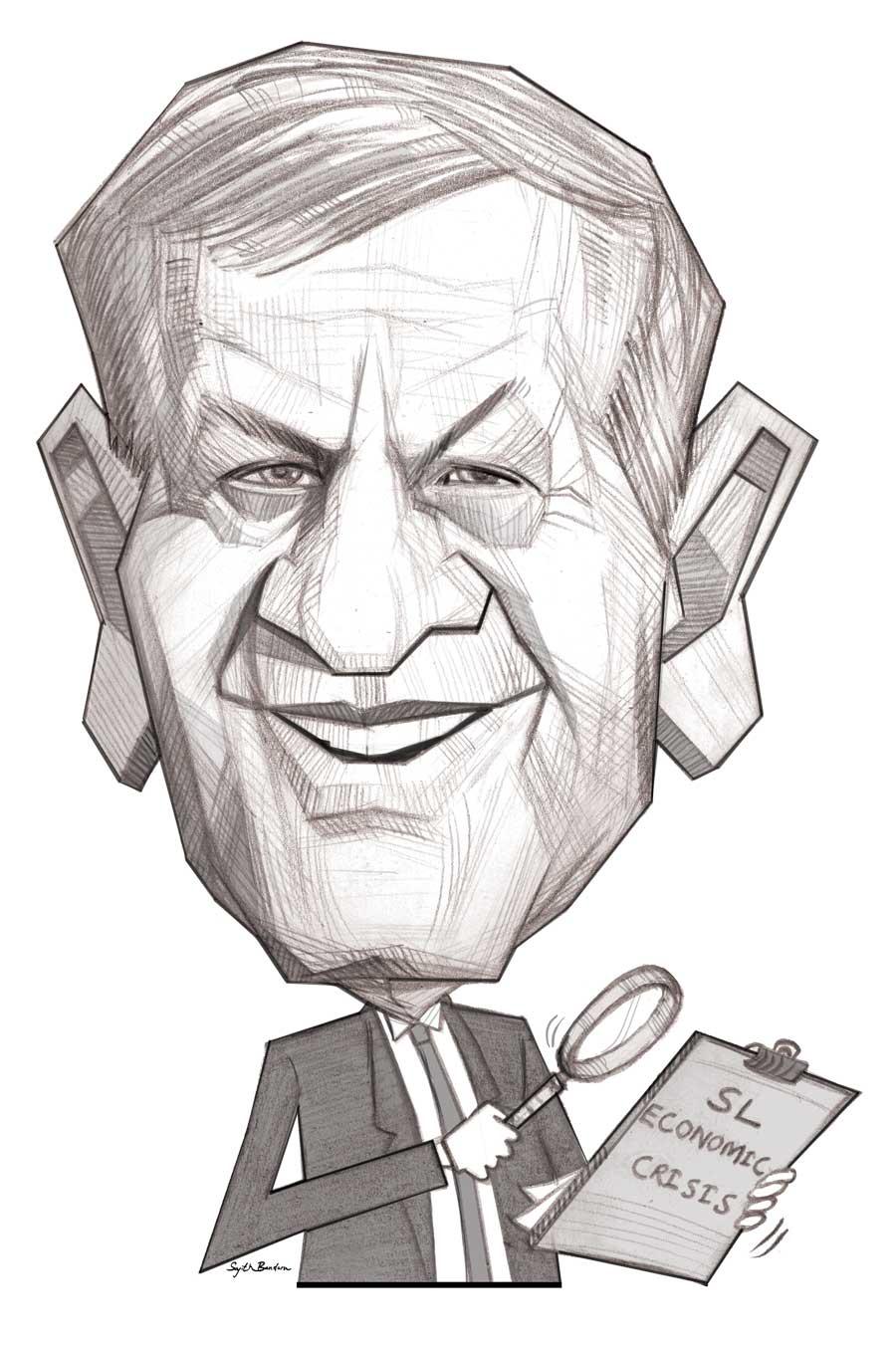19 Oct 2022 - {{hitsCtrl.values.hits}}

Ruwan Wijewardene (on left) the Deputy Leader of the United National Party and Senior advisor to President Ranil Wickremesinghe on climate change is seen at a meeting with Norwegian Eric Solheim who was recently assigned a new task to be an advisor on climate change to the Sri Lankan President
- Sri Lanka must expedite process to switch to renewable energy
- Many jobs on offer in green economy
- Ranil dedicated to green development
- Sri Lanka should learn from India and China
Eric Solheim played a critical role in Sri Lanka as peace negotiator during the civil war. Solheim returned to Sri Lanka at the invitation of President Ranil Wickremesinghe. Solheim has been assigned a new task by President Wickremesinghe. He has been appointed as an advisor on climate change to President Wickremesinghe. Following are excerpts of a brief interview done with Solhiem.
to Sri Lanka at the invitation of President Ranil Wickremesinghe. Solheim has been assigned a new task by President Wickremesinghe. He has been appointed as an advisor on climate change to President Wickremesinghe. Following are excerpts of a brief interview done with Solhiem.
 Q How does it feel to be back in Sri Lanka?
Q How does it feel to be back in Sri Lanka?
Let me start by telling you how happy I am to be able to come back to Sri Lanka. This is the most beautiful island in the world with so many great people and I’m happy if I can make a small contribution to help Sri Lanka to find a way out of the economic crisis, but a green way out of the economic crisis. Because there are so many jobs to be had if you move into renewable energy, electric mobility, tree planting and green agriculture. You can get out of the crisis economically providing jobs, but also being much kinder to modern earth.
Q The last time you were here was in 2006. What sort of changes do you see in the country since then?
I see a lot of positive changes. Of course I have this time only been to Colombo. There’s a completely new motor road from the airport to town. If you go around in Colombo you see a well-organised city. There are very few potholes and lots of skyscrapers and new and nice buildings have come up. So, I see a lot of development. Of course, I know that many Sri Lankans are suffering from power cuts, some people in the countryside may have difficulties getting enough meals a day, inflation is hitting a lot of people hard, so I know that many people are suffering. But I also want to celebrate the enormous progress in Sri Lanka since I was here last time.
Q So your last role in Sri Lanka was as a peace negotiator and now you are advisor on climate change. What do you expect to achieve in this new role?
All the main decisions will be made by the President and by the Parliament of Sri Lanka. I can only advise. I think I can bring the best practice from other parts of the world. Interestingly enough the two main developing countries, China and India, are now global leaders of environment putting out into practice green policies. I can bring the best knowledge from other parts of the world. I can help bring expertise and maybe I can also help bringing investors from Europe, China, India. Which can invest in solar energy and green hydrogen, in all the technologies which Sri Lanka will need to provide jobs for future generations of Sri Lanka.
Q Ranil Wickremesinghe seems to have taken a special liking towards you. You were peace negotiator when he was Prime Minister. Then he met you when you were the UN Executive Director for the Environment Program and he sought your assistance even then. Now he has sought your assistance again. This is coming at a time when there are other politicians in Sri Lanka who don’t really like you. So what does Ranil Wickremesinghe see in you that others don’t?
Well first of all, of course, I developed a very close relationship with Ranil Wickremesinghe through many years of peace talks. But I would add that contrary to what many people believe I have a good relationship with so many other Sri Lankan politicians. I met with Mahinda Rajapaksa and we gave each other a big hug. I of course know so many Tamil leaders like Mr. Sampanthan and Sumanthiran. So, my love is not for one particular politician, but for the nation of Sri Lanka and for the most beautiful island on planet earth. I’ve been asked by the President if I can help. Me and President Nasheed of the Maldives. This is to see if we can mobilise International expertise, knowledge and potential investment for the greening of not just Sri Lanka, but also for the greening of the entire region, Maldives, Seychelles, South Asian and the Indian Ocean.
Q So, Sri Lanka is trying to take a lead role in promoting a green economy in the region?
Absolutely. Of course the President is very dedicated to green development. I think he will make a very strong speech in the climate talks in Egypt next month where he will set out the need to place a much bigger emphasis globally on the environment, but will also try to put Sri Lanka in the lead role on this and that will happen when you invest heavily in renewables in Sri Lanka in the Greening of the land in tree planting, green agriculture, ecotourism. Tourism creates numerous jobs. I will do my utmost and appeal to every tourist to go back to this fantastic land. Of course tourists will also be doing better if people can come with good consciousness seeing this as a green tourist destination.
Q Climate change is something that Sri Lanka has not really taken very seriously in the past. What do you think Sri Lanka needs to do to face the impact of climate change?
First of all to see going green as an enormous opportunity. The Chinese President XI says green is gold. What does it mean? By going green they can create enormous prosperity, getting jobs and bringing all Chinese up to the middle class. India is also exactly the same. Prime Minister Modi is starting up new solar programs in India every day and there is so much happening in this space. He has launched a green hydrogen mission for India and all this is with the double purpose of going green and providing jobs and getting people out of poverty. So, I think Sri Lanka should take this lesson from both India and China to see how it’s an enormous opportunity for Sri Lanka to get out of the economic crisis, get everything into the middle class, but doing it by renewable energies and all the green technologies which are now available. Solar energy by the way is much cheaper than coal, so by going solar you do much better and you also save money and create more jobs.
Q Is Sri Lanka going too slowly in its attempts to reduce the dependency on coal power? Should Sri Lanka expedite the process to switch to renewable energy?
Absolutely, they need to do that, but not just Sri Lanka the entire world. Last year President XI of China promised that China will stop all overseas cold investments. That was the most significant decision for the environment done anywhere in the world that year. In India when Prime Minister Modi has launched the solar mission, green hydrogen mission, electric mobility mission. And the big players of the industry in India are reacting immediately and going very fast to green. So if we look into the next five years China will be the number one solar and renewable power in the world, India will most certainly be the second. But Sri Lanka can benefit from the examples by these two major nations. Of course Sri Lanka can also do better than them in certain areas.
Q You spoke earlier about the development that you see in the country. Since the end of the war Sri Lanka went through rapid development. We saw new highways coming up, bridges and other infrastructure. This seems to have been done at the expense of the environment. In places like Hambantota we saw highways being built, a new airport, etc. But at the same time forests were destroyed as a result. How do you see this?
I do not know what happened in all these cases in Sri Lanka, but that is the old development model. True in the 20th Century if we wanted to develop we couldn’t do it without a substantial degradation of a nature. If you really wanted to get rich you needed to destroy nature and they needed to build the development on fossil fuels and particularly on coal. But in the 21st Century solar is much cheaper than coal, so you save money, create more jobs and do better financially if you go into the solar industries. The Indian state of Telangana, which is one of the most modern, most fast developing states of India, has increased the tree cover by three percent over the last decade. Indonesia, which is also a very fast developing country, had zero deforestation last year which is such an achievement. Why? Because the government had put in place their drive policies and because all the big players of the industry understand that they can make the moment, they can have palm oil, they can have timber, but they can do all that without destroying nature.
That’s what’s new in the 21st Century. We have win-win policies. It’s good for nature, good for people and the economy at the same time. But this is also what happened basically everywhere in the world. Now in most nations, business is far ahead of political leaders when it comes to understanding the need to protect mother earth.
Q The economic crisis in Sri Lanka has gone from bad to worse. Are you considering getting involved in a big way there as well to help Sri Lanka?
a big way there as well to help Sri Lanka?
I’m very happy to help Sri Lanka in modest ways; like helping to bring more tourists to Sri Lanka and helping to bring more green investment to Sri Lanka. But of course the negotiations with the International Monetary Fund and the big decisions on the economic development of Sri Lanka will always be made by Sri Lanka. No foreigner can help. But we need to understand our role and the decisions will have to be made by the President and by the Parliament.

08 Jan 2025 2 hours ago
08 Jan 2025 2 hours ago
08 Jan 2025 3 hours ago
08 Jan 2025 3 hours ago
08 Jan 2025 4 hours ago